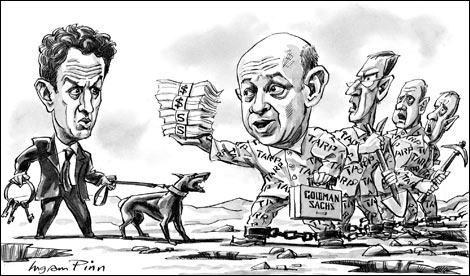
It doesn't seem like she was far off, but anyone could have seen this collapse coming if they just looked at the situation through a critical lens, rather than through rose-colored glasses. Our world is rarely rosey.Nearly thirty years after her death, Ayn Rand’s novels continue to be wildly popular—"Atlas Shrugged" alone is selling more today than it did when it was first published in 1957 -- more than one million copies have sold since the 2008 elections.
Was the solution to “go Galt” and quit society? No, Rand again answered. The solution was simultaneously much easier and much harder. “So long as we have not yet reached the state of censorship of ideas,” she once said, “one does not have to leave a society in the way the characters did in Atlas Shrugged. . . . But you know what one does have to do? One has to break relationships with the culture. . . . [D]iscard all the ideas—the entire cultural philosophy which is dominant today.”"
If Atlas Shrugged" has been on your list of books-I’ve-been-meaning-to-get-to, then consider finding out for yourself how a story published in 1957 so eerily captures the world we live in today and so beautifully presents a road to a brighter future.
How Did Ayn Rand's 'Atlas Shrugged' Predict An America Spinning Out Of Control? | Fox News


















 And of course, there was the policy brutality many of us witnessed first-hand on the street. It still boils my blood when I hear the protests referred to as a "riot." A handful of black-masked kids trashing a few corporate storefronts is not a riot. A squad of heavily armored police rushing a group of sitting, peaceful demonstrators, pepper-spraying them point-blank and hauling them off to vans with bruises and broken bones... that's closer to the definition of a riot in my opinion.
And of course, there was the policy brutality many of us witnessed first-hand on the street. It still boils my blood when I hear the protests referred to as a "riot." A handful of black-masked kids trashing a few corporate storefronts is not a riot. A squad of heavily armored police rushing a group of sitting, peaceful demonstrators, pepper-spraying them point-blank and hauling them off to vans with bruises and broken bones... that's closer to the definition of a riot in my opinion..jpg)





